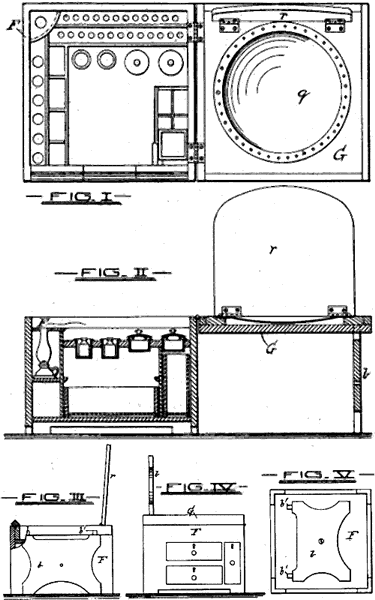Be it known that I, Joseph W. Waller, of the city of Baltimore, in the State of Maryland, have invented certain Improvements in Shoe-Maker’s Cabinets or Benches, of which the following is a full, clear, and exact description.
The invention relates to a combined cabinet and seat, having its various parts constructed so and arranged as hereinafter described.
In the drawings, Figure I is a plan view of the invention opened. Fig. II is a longitudinal section thereof when in the saine position. Fig. III is an end view of the same when in the same position. Fig. IV shows the front of the invention closed, and with a supplemental back, hereinafter mentioned. Fig. V shows the bottom of the cabinet closed and prepared for shipment.
Similar letters of reference indicate similar parts in all the views.
The main portion of the cabinet is designated by F. It is provided with suitable compartments, divisions, boxes, jars, bottles, pockets, &c., for holding the various tools, articles, and substances used by the craft. It is also provided with a lamp for heating purposes, and with a grooved edge (shown in Figs. I and III) for receiving one or more stones for sharpening tools.
The lid G is provided with the ordinary calf-skin seat q, and a hinged back is provided in r. The leg which sustains the outer end of the hinged lid G when opened out is shown by b. It is provided with pins b', which fit in holes in the lid, as shown in Fig. III.
When the cabinet is closed the leg may form a back, as shown in Fig. IV, when the top of the cabinet constitutes a seat. When the cabinet is prepared for shipment the leg is secured under the cabinet, as shown in Fig. V.
Having described my improved cabinet, I claim as my invention—
A shoe-maker’s cabinet or bench having the hinged lid G, provided with a seat, and the folding back r, combined with the detachable leg b, the whole being arranged to be folded to form a compact box, substantially as and for the purposes specified.
J. H. Proctor.





